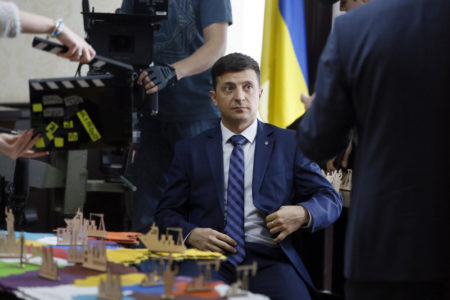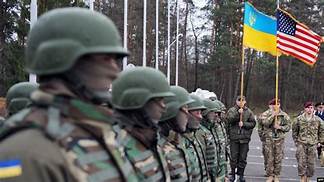Western leaders create narratives they do not believe as a formality to establish policies against Russia.
Written by Lucas Leiroz, researcher in Social Sciences at the Rural Federal University of Rio de Janeiro; geopolitical consultant.
Anti-Russian hysteria is growing day after day in the West, as Western media agencies spread unfounded paranoia about the possibility of a Russian invasion of Ukrainian territory. Officially, NATO countries adopt these speeches, but internally, their leaders and strategists know the fallacy behind it, taking it as a necessary formality in order to establish international policies of pressure and encirclement against Russia. In Kiev, on the other hand, anti-Russian ideological thinking – permeated with racism and xenophobia – does not allow for a proper rational analysis of the evidence of such a “threat”. As a result of this scenario, Western countries create their own narratives, changing them whenever they want, while Ukraine only automatically reproduces imported speeches from countries that could eventually guarantee its defense in a conflict scenario, creating a relationship of true dependence and neocolonialism.
The recent virtual summit between Joe Biden and Vladimir Putin has been able to bring some very interesting reflections on the current status of the relations between Russia, the West and Ukraine. The growth of rumors about a “Russian invasion” in Ukraine was the pretext through which Biden tried to urge Putin to open the dialogue according to his interests. The existence of such an “invasion plan”, as well as the reasons behind it, mattered little to the meeting but as a provocative question through which a mutually exploratory dialogue could be established.
Due to the confidential nature of the meeting, not all details are known at this time. However, according to what was officially reported by the spokespersons of both countries, it is possible to take note of the main issues of the summit. Putin was concerned to emphasize points concerning NATO’s moves on the Russian western border and the deployment of the alliance’s offensive weapons on Ukrainian soil, as well as highlighting the importance of fulfilling the demands made by Moscow to the West as a guarantee of peace. In response, Biden announced possible sanctions in the event of escalating tensions in Ukraine, as well as his interest, together with other Western countries, in strengthening dialogues with Russia on all these issues. The meeting ended with a tense but friendly promise to schedule a summit between NATO and Russia, with the aim of easing hostilities on the Russian-Ukrainian border.
Immediately after the summit, Biden and his team contacted the countries that “really matter” to discuss relevant issues: UK, France, Germany, Italy. And, as expected, Ukraine was left out of the subject. Kiev, which is supposedly an “indispensable ally” of the US, as well as being the subject of the meeting itself, was not allowed to know the details of the conversation between Biden and Putin, which clearly reveals Ukraine’s current position for the West.
Assuming that there really was a Russian invasion plan against Ukraine and that this issue had been taken seriously in a meeting between Putin and Biden, certainly, the Ukrainian government would not only be the most interested party, but it would also be minimally ethical for the US, as an ally of Ukraine, to inform the country’s forces about the correct positions to be taken. But, for sure, this is not the case. Zelensky does not even seem surprised that he has not received a call from his friend at the White House with the details of the meeting. Apparently, the Ukrainian government “knows its place”.

Ukrainian comedian Volodymyr Zelensky on set in Kiev, Ukraine, during filming of “Servant of the People” on Feb. 6. (Efrem Lukatsky/AP)
The problem with this entire issue is that no Western strategist or head of state believes the narrative of the “Russian invasion”. Hysteria permeates Ukraine and some Eastern European countries that have decided to ally with the West – at best, there is some real impact on Western public opinion, which is absolutely uncertain. Other than that, it is just a pretext to justify moves in the world arena. The main NATO countries, which know the details of the summit, will certainly not at any time deny that such an invasion plan was real and, after the summit and the possible collective meeting of NATO with Putin (yet to be scheduled), they will say that, through diplomacy, they have once again prevented a possible attack on Ukraine. Bureaucrats in Kiev will have no choice but to endorse such speech and, to “reward” the West for its “favor”, make Ukraine even more submissive to NATO’s interests, perpetuating a semi-colonial and extremely dependent relationship.
In fact, the fallacy of the Russian invasion plan is increasingly discredited, being abandoned even by the most fanatically anti-Russian analysts and digital influencers. Moscow clearly does not deal with Ukraine as an equal. The dialogue on the Ukrainian issue is held directly with Washington and NATO, so that Kiev is not even considered an independent state today by either side – which makes a possible idea of invasion extremely absurd. Russia, for its part, is just respecting the choice that Ukraine made in 2014, when it decided to ally itself with NATO: to integrate with the West, not as an allied National State, but as a semi-colony, which automatically imports and reproduces all sorts of anti-Russian discourse – not believed or respected by the Western countries themselves.
More and more, Ukraine is used by the West. When relevant issues need to be discussed between NATO and Russia, an “invasion plan” is “reported” in order to call for an emergency meeting, in which Ukraine is not even seriously discussed. For Kiev, the partnership with the West means less and less and this, at some point, will become visible to the Ukrainian people, changing public opinion, and promoting reforms in favor of a more neutral foreign policy in relation to the NATO-Russia disputes. This is what Moscow expects – and an invasion is not part of Russian plans simply because it would make such an expectation impossible.
With each Russian invasion that fails to materialize, Zelensky is increasingly discredited, Ukrainian ties with the West seem more and more neo-colonial, and Moscow makes clear its intention to pacify tensions on the western border.






